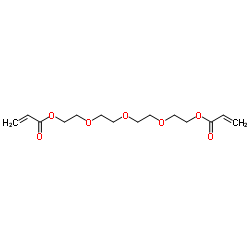Tetra(ethylene glycol) diacrylate

Tetra(ethylene glycol) diacrylate structure
|
Common Name | Tetra(ethylene glycol) diacrylate | ||
|---|---|---|---|---|
| CAS Number | 17831-71-9 | Molecular Weight | 302.320 | |
| Density | 1.1±0.1 g/cm3 | Boiling Point | 381.5±27.0 °C at 760 mmHg | |
| Molecular Formula | C14H22O7 | Melting Point | 41990ºC | |
| MSDS | Chinese USA | Flash Point | 165.2±23.8 °C | |
| Symbol |


GHS05, GHS07 |
Signal Word | Danger | |
| Name | 2-[2-[2-(2-prop-2-enoyloxyethoxy)ethoxy]ethoxy]ethyl prop-2-enoate |
|---|---|
| Synonym | More Synonyms |
| Density | 1.1±0.1 g/cm3 |
|---|---|
| Boiling Point | 381.5±27.0 °C at 760 mmHg |
| Melting Point | 41990ºC |
| Molecular Formula | C14H22O7 |
| Molecular Weight | 302.320 |
| Flash Point | 165.2±23.8 °C |
| Exact Mass | 302.136566 |
| PSA | 80.29000 |
| LogP | 0.34 |
| Vapour Pressure | 0.0±0.9 mmHg at 25°C |
| Index of Refraction | 1.457 |
| Water Solubility | H2O: soluble |
CHEMICAL IDENTIFICATION
HEALTH HAZARD DATAACUTE TOXICITY DATA
MUTATION DATA
|
| Symbol |


GHS05, GHS07 |
|---|---|
| Signal Word | Danger |
| Hazard Statements | H302-H314 |
| Precautionary Statements | P280-P301 + P312 + P330-P303 + P361 + P353-P304 + P340 + P310-P305 + P351 + P338 |
| Personal Protective Equipment | Faceshields;full-face respirator (US);Gloves;Goggles;multi-purpose combination respirator cartridge (US);type ABEK (EN14387) respirator filter |
| Hazard Codes | C: Corrosive; |
| Risk Phrases | R34 |
| Safety Phrases | S26;S27;S28;S45;S36/S37/S39 |
| RIDADR | UN 1760 |
| WGK Germany | 2 |
| RTECS | AS8100000 |
| Packaging Group | III |
| HS Code | 2918990090 |
| HS Code | 2918990090 |
|---|---|
| Summary | 2918990090. other carboxylic acids with additional oxygen function and their anhydrides, halides, peroxides and peroxyacids; their halogenated, sulphonated, nitrated or nitrosated derivatives. VAT:17.0%. Tax rebate rate:13.0%. . MFN tariff:6.5%. General tariff:30.0% |
|
Near IR fluorescent conjugated poly(ethylene glycol)bisphosphonate nanoparticles for in vivo bone targeting in a young mouse model.
J. Nanobiotechnology 13 , 80, (2015) Bisphosphonate (BP) compounds are widely used in the treatment of bone disorders. This group of drugs with a high affinity to Ca(+2) ions is rapidly attracted to bone mineral, especially in areas of h... |
|
|
Biomimetic hydrogels gate transport of calcium ions across cell culture inserts.
Biomed. Microdevices 14(3) , 549-58, (2012) Control of the in vitro spatiotemporal availability of calcium ions is one means by which the microenvironments of hematopoietic stem cells grown in culture may be reproduced. The effects of cross-lin... |
|
|
Tetraethylene glycol diacrylate.
Am. Ind. Hyg. Assoc. J. 42(11) , B49-50, (1981)
|
| 13-Oxo-3,6,9,12-tetraoxapentadec-14-en-1-yl acrylate |
| TTEGDA |
| Tetraethylene Glycol Diacrylate |
| Viscoat 335HP |
| 2-propenoic acid, 3,6,9-trioxaundecane-1,11-diyl ester |
| 2-Propenoic acid, oxybis(2,1-ethanediyloxy-2,1-ethanediyl) ester |
| Tetra(ethylene glycol) diacrylate |
| Oxybis(2,1-ethanediyloxy-2,1-ethanediyl) bisacrylate |
| Aronix M 240 |
| 13-oxo-3,6,9,12-tetraoxapentadec-14-en-1-yl prop-2-enoate (non-preferred name) |
| EINECS 241-789-3 |
| Acrylic acid,diester with tetraethylene glycol |
| MFCD00008630 |